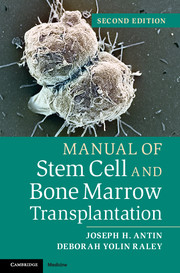Book contents
- Frontmatter
- Contents
- Acknowledgments
- Contributor
- 1 Rationale for transplantation
- 2 Types of transplantation
- 3 Human leukocyte antigen matching in allogeneic transplantation
- 4 Stem cell source
- 5 Pretransplant evaluation and counseling of patient and donor
- 6 Conditioning regimens
- 7 Stem cell infusion
- 8 ABO compatibility
- 9 Engraftment
- 10 Preventative care
- 11 Transplant-related complications
- 12 Overview of acute and chronic graft-versus-host disease
- 13 Acute graft-versus-host disease and staging
- 14 Graft-versus-host disease prophylactic regimens
- 15 Treatment guidelines for acute graft-versus-host disease
- 16 Chronic graft-versus-host disease
- 17 Engraftment syndrome
- 18 Infectious disease
- 19 Graft rejection and failure
- 20 Gastrointestinal complications
- 21 Oral health in stem cell transplantation
- 22 Pulmonary complications
- 23 Veno-occlusive disease
- 24 Special transfusion-related situations
- 25 Cardiovascular complications
- 26 Neurologic complications
- 27 Cystitis
- 28 Donor lymphocyte infusion
- 29 Transplantation: regulation and accreditation
- Index
- References
22 - Pulmonary complications
Published online by Cambridge University Press: 05 November 2013
- Frontmatter
- Contents
- Acknowledgments
- Contributor
- 1 Rationale for transplantation
- 2 Types of transplantation
- 3 Human leukocyte antigen matching in allogeneic transplantation
- 4 Stem cell source
- 5 Pretransplant evaluation and counseling of patient and donor
- 6 Conditioning regimens
- 7 Stem cell infusion
- 8 ABO compatibility
- 9 Engraftment
- 10 Preventative care
- 11 Transplant-related complications
- 12 Overview of acute and chronic graft-versus-host disease
- 13 Acute graft-versus-host disease and staging
- 14 Graft-versus-host disease prophylactic regimens
- 15 Treatment guidelines for acute graft-versus-host disease
- 16 Chronic graft-versus-host disease
- 17 Engraftment syndrome
- 18 Infectious disease
- 19 Graft rejection and failure
- 20 Gastrointestinal complications
- 21 Oral health in stem cell transplantation
- 22 Pulmonary complications
- 23 Veno-occlusive disease
- 24 Special transfusion-related situations
- 25 Cardiovascular complications
- 26 Neurologic complications
- 27 Cystitis
- 28 Donor lymphocyte infusion
- 29 Transplantation: regulation and accreditation
- Index
- References
Summary
Pulmonary injury is one of themost common complications of stem cell transplantation and a major cause ofmorbidity and mortality. Damage to the lungs can be multifactorial,including infection, chemotherapy toxicity, graft-versus-host disease(GVHD), radiation injury, hemorrhage, and immune reactions. Potentialetiology can be determined by carefully considering timing of pulmonarycomplications and whether the radiographic studies are focal or diffuse.Important also to consider is history including exposure to infectiousagents, current and recent prophylaxis regimen, cytomegalovirus (CMV) statusof patient and donor, prior treatment and exposure to pulmonary/cardiotoxictherapy, and current and recent immunosuppression therapy.
All patients should havebaseline pulmonary function tests (PFTs) before transplantation, and anaggressive diagnostic approach should be taken early after transplantationif there are pulmonary problems.
In general, patients withdyspnea and normal chest X-ray (CXR) should undergo PFTs and arterial bloodgas analysis. Restrictive physiology should prompt a chest CT (to look forinterstitial disease). In patients with normal PFTs and CXR, cardiac causessuch as pulmonary hypertension and cardiac dysfunction should beexcluded.
Bronchoscopy withbronchoalveolar lavage (BAL) should be performed early in the search for adiagnosis. If no diagnosis is made, lung biopsy if possible should beconsidered. Patients with focal ini ltrates should be given empiricantibiotics plus or minus fungal therapy and assessed for a response beforeinvasive measures are taken.
- Type
- Chapter
- Information
- Manual of Stem Cell and Bone Marrow Transplantation , pp. 154 - 161Publisher: Cambridge University PressPrint publication year: 2013



